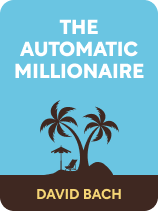

This article is an excerpt from the Shortform book guide to "The Automatic Millionaire" by David Bach. Shortform has the world's best summaries and analyses of books you should be reading.
Like this article? Sign up for a free trial here .
What is compound interest? How does putting even a small amount of money into an account that accrues compound interest benefit your finances?
Compound interest is the interest accrued on a loan or deposit. According to David Bach, the author of The Automatic Millionaire, everyone can leverage the power of the compound interest to start building wealth. While investing a few dollars itself won’t make you a millionaire, putting those dollars in an account that pays compound interest is much better than keeping them in a checking account.
Keep reading below to learn about compound interest, explained with examples.
How Compound Interest Grows Your Money
Here is how The Automatic Millionaire explained compound interest:
When you save your money in a checking account, you accumulate money for future use, but the amount doesn’t grow beyond what you put in. However, when you invest your money in an account that pays compound interest, you leverage your money—that is, you use it to generate further income in the form of interest payments. For example, if you invest your money in an account that pays you 10% annual interest, this means that you’ll receive an extra 10% of what you invested after one year: Invest $100 and after a year, your money will be worth $110.
Bach also notes that thanks to compound interest, the interest you earn also earns interest—the $110 after another year will be worth $121 ($110 + 10%). After another year, it will be worth $133.10. In addition, the more money you continue to add to this account, the more interest you’ll earn. This is how compound interest transforms small, consistent amounts of money into free money over the course of time.
To understand how compound interest could be earning money for you at your current income level, reexamine the unnecessary expenses you could cut out. For example, let’s assume that you’ve been spending $1.45 each day on bottled water, which amounts to $529.25 a year, and $15,877.50 over the course of 30 years. So, over the course of 30 years, you could save almost $16,000 if you eliminated this expense.
Now, if instead of simply saving your bottled water money, say you invested this money for an annual return of 10% and continued to invest $1.45 per day ($44 a month), your money would grow as follows:
| Your Investment | |
| After 10 years | $8,437.85 |
| After 20 years | $30,319.68 |
| After 30 years | $87,075.54 |
This means that in an account that pays compound interest, the money you’re spending on bottled water could actually create over $87,000 for you over the course of 30 years.
(Shortform note: Calculating compound interest as Bach suggests can seem daunting if you’re not mathematically-minded. Use a compound calculator to figure out how much money you could earn from the small, wasteful expenses you chose to cut earlier in this chapter.)
| What Is Wealth? Bach’s advice here isn’t revolutionary: The majority of finance books, including I Will Teach You to Be Rich and The Barefoot Investor, also discuss the benefits of applying compound interest to grow your wealth. The general consensus is: If you want to create wealth, take advantage of compound interest to grow your money. But what exactly is wealth and how do you differentiate it from having a high income? According to the authors of The Millionaire Next Door, wealth is defined by what you accumulate. So even if you earn millions, you’re not considered wealthy if you spend it all and don’t invest any of your money. On the other hand, if you earn a modest income but invest a portion of your income, you can accumulate great wealth. Another way to define if you’re wealthy is to figure out how much you need to work to survive and maintain your lifestyle. Do you need to work every day just to keep up with all of your expenses, or do you have breathing room in the form of savings and passive income? Compound interest is a form of passive income because it earns money for you even when you’re not actively working. Creating wealth is a choice—it often involves having to make sacrifices now to earn more later. But, it’s worth the payoff if you can set yourself up to become financially independent. |
Invest Early to Earn More
Bach claims that the sooner you start investing, the more compound interest will earn for you and the more likely you’ll be to achieve financial security. The following chart illustrates how much you can earn based on what age you start. It’s based on an investment of $3,600 a year (less than $10 a day) and an annual return of 10%.
| Investment Earnings | Start investing at age 25 | Start investing at age 35 | Start investing at age 45 |
| Age 35 | $66,712.20 | $0 | $0 |
| Age 45 | $230,409.00 | $66,712.20 | $0 |
| Age 55 | $654,996.33 | $230,409.00 | $66,712.20 |
| Age 65 | $1,756,266.52 | $654,996.33 | $230,409.00 |
The chart clearly illustrates the benefits of investing early—in the example above, the 25-year-old investor ended up with over $1.5 million more than the 45-year-old investor. Further, even if your investments earn less than 10% a year, your money will still grow more than it can if it remains static in your checking account.
| If You’re Feeling Behind, You’re Not Alone If you haven’t yet started to invest your money, this section may make you feel a little uncomfortable about the thousands of dollars you’ve lost in potential investment gains. You’re not alone—according to polls, many Americans feel guilty about financial decisions they’ve made (or not made): 31% of Americans regret not saving for their retirements earlier.24% of Americans regret not investing in stocks earlier. This sentiment holds true regardless of age: 77% of millennials and 76% of baby boomers wish they’d started to invest earlier. Surprisingly, even 69% of respondents aged between 18-22 share this regret. Bach provides helpful advice to overcome these feelings and dive into investment, no matter your age, in Start Late, Finish Rich. His suggestions include exploiting your earning potential to maximize your earnings and increasing your savings goals to 25% of your income so you can make up for the lost time. |

———End of Preview———
Like what you just read? Read the rest of the world's best book summary and analysis of David Bach's "The Automatic Millionaire" at Shortform .
Here's what you'll find in our full The Automatic Millionaire summary :
- A simple but powerful action plan for you to quickly automate your finances
- How to grow your finances with just a few dollars a day
- An exploration of why people fail to prepare for their financial futures






